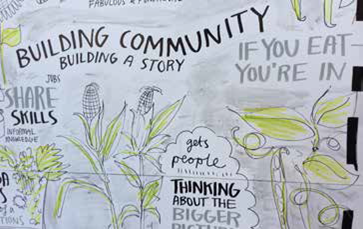On June 3rd we held the final event in our Food Values project – a day-long workshop in Cardiff involving stakeholders from a range of food and sustainability focused programmes, including representatives from Welsh Government’s Waste Strategy Team, Public Health Wales, through to local schools, church groups and gardening projects. We were also joined by Peter Davies the Sustainable Futures Commissioner and Jane Davidson the former Minister for the Environment who now is now heading INSPIRE at Trinity St David’s.
The workshop had two aims: firstly to disseminate the findings of our research over the last year, sharing the lessons we have learnt and now published in our ‘Food Values’ report (which is available here: Food_Values_Report). Secondly, to begin a wider conversation about the food futures that people in Wales would like to see, reflecting explicitly on how a values approach can help us move towards this goal.
This aspiration for a Food Manifesto is set out as a key recommendation in our report, where we outline the importance of bringing different people together, across the food system, to find common ground through discussion of our values. Peter Davies and Jane Davidson began the day championing this goal, outlining how a Food Manifesto could be central to informing the delivery of the Well-being of Future Generations Act, which is the policy vehicle for advancing sustainability in Wales. They encouraged us to use the day as a first step in a wider conversation with people across Wales, taking a values-led approach to food.
We would welcome all of you to participate in the next step of this journey – so please get in touch if you have points to include or want to work with us to take this forward.
Whilst we all have values, many of us don’t think too deeply or too often about how values affect our decisions – let along how values inform the food system we are part of. Our research is designed to get people to re-engage and appreciate the work values do in the food system. To kick-start this type of thinking amongst our workshop participants, Bec Sanderson from PIRC explained that everyone shares values and society can shape these by reinforcing particular messages. Values are not set in stone, they can be strengthened like muscles the more we engage them. This is important because we need to ensure our institutions and policies actually reflect and engage the values that people care about – otherwise we can unwittingly undermine them. Bec also demonstrated how values connect issues and can help us move beyond single-issue thinking – which is so important for the consideration of food where we have previously taken a divided approach to issues of food poverty, health, and environmental sustainability.
Presenting findings from our research, I then outlined how people across Wales have been talking about food at our events. Key themes included:
Good food should be available to everyone -it shouldn’t be a luxury commodity. Fresh, healthy food ought to be available to everyone – whatever their social status.
Looking beyond money – People did talk about money but we found that it didn’t dominate the conversations and people could emphasise issues like social justice, which they factor into their ‘economic’ decision making. This reminded me of a statement that Henry Ford once made: “A business that makes nothing but money is a poor kind of business”
Getting back in touch with food. The provenance of food was a commonly cited concern. Participants also stressed a need to re-skill themselves to cook, to grow, preserve and forage.
Drawing together the conclusions from our report, I outlined that:
Food has enormous potential as a social equaliser. It is immediately understandable, fun and emotional for people of different ages, classes, regions and nationalities. We all eat!
Values help connect food to other issues & move beyond our differences. Getting people to consider values and motivations allows participants to look beyond narrow issues, and areas of disagreement, to engage with the deeper motivations that underpin a variety of actions. By digging deeper we can often find commonalities in our aligned values.
Enhancing values of Universalism and Benevolence though food is relatively easy. Many people identify with them, supporting community-building through local food or sharing mealtimes, for instance. Food education therefore offers an important way to reinforce and enhance these values that are so important to the wider well-being and sustainability of our society.
In the afternoon we moved into workshop groups to enable participants to share their own values and responses. Workshops were themed as follows to address the four pillars of sustainability:
- Society – Tackling food inequality
- Economy – Growing Wales’ fruit and veg sector
- Environment – Is food an environmental issue?
- Culture & identity – Why Welsh Values matter
We will present the findings of these in our next blog… but in the meantime please share the report and have a look at #foodvalues for more insights from the day.




[…] On 3 June in Cardiff we held the final conference of the Food Values project. At the conference, which drew together some 50 people from health, education and other food backgrounds and presented our findings, drawn from analysis of five food events held around Wales. We also used the conference to launch a conversation about food in Wales, by inviting people to contribute to a Food Manifesto. There’s a report of the day here. […]
LikeLike